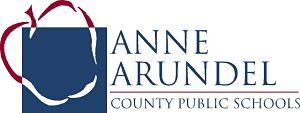*Students names have been changed to protect their privacy and safety.
At Northeast High School, Jackie Schrader and Sam,* a senior, sit down to talk about Sam’s plans after graduation. Sam is a student with disabilities who receives special education services at Northeast and is facing the question that every AACPS student faces in their senior year—what to do next. But as a student with disabilities, Sam faces unique challenges and needs more support both in and out of school in order to be ready for the “real world” after graduation. This, is where Jackie, a Transition Facilitator, comes in.
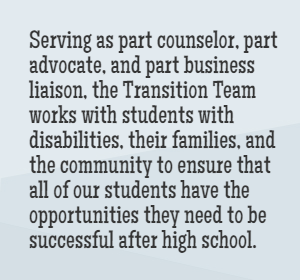 One of six Transition Facilitators in Anne Arundel County Public Schools, Jackie works with high school students with disabilities to help students and families prepare for and transition to life after high school. With the support of the county’s six Vocational Technicians, this dedicated Transition Team serves as part counselor, part advocate, and part business liaison to work with students, families, and the community to ensure that all of our students have the opportunities they need to be successful.
One of six Transition Facilitators in Anne Arundel County Public Schools, Jackie works with high school students with disabilities to help students and families prepare for and transition to life after high school. With the support of the county’s six Vocational Technicians, this dedicated Transition Team serves as part counselor, part advocate, and part business liaison to work with students, families, and the community to ensure that all of our students have the opportunities they need to be successful.
The Role of the Transition Team
In AACPS, over 9,000 students receive special education services. Whether their needs are physical, cognitive, behavioral, or emotional, each of these students is unique and has an Individualized Education Program (IEP). (An IEP is an academic plan created by school staff and the family to outline the support that the student needs to be successful). When a student gets to high school, one of the most important components of a student’s IEP is the transition plan, which identifies a child’s goals after high school and outlines a set of activities that will allow the student to obtain those goals. Based on the student’s interests, skills, and needs, a transition plan may include vocational training, life skills development, and/or college coursework.
To help create and fulfill a transition plan, schools rely on the support of their Transition Team. Comprised of a lead transition facilitator partnered with a vocational technician, each of the county’s six transition teams are responsible for serving between 300-600 students across two high school feeder systems. Working with the student, family, and special education staff, the transition facilitator helps navigate the complex language and regulations surrounding state and federal transition requirements to develop a plan that fits each unique student. Once the outline of the plan is established, the transition facilitator helps the vocational technician identify appropriate job opportunities and work with the businesses in the community to find appropriate placements.
Beyond helping families understand the process, transition teams help students and families take the time to think about their next steps. “As a teacher in high school and as a parent, your focus is getting kids through high school,” Jackie says. “Transition facilitators take a totally different view—slow down, what’s next?…Whether they’re going to college or not, kids need help and parents don’t know the supports that are outside [the school system].”
Preparing Families for Life Beyond High School
Following Maryland state laws, students with disabilities are entitled to receive special education services—from transportation to education—until they turn 21 years old. Whether they are diploma-bound (on the path to receive a traditional high school diploma) or will receive a Maryland High School Certification of Program Completion (awarded to students with more severe special education needs), AACPS students with disabilities receive additional support from teachers and school staff to ensure they have the support they need to meet their goals academically and socially.
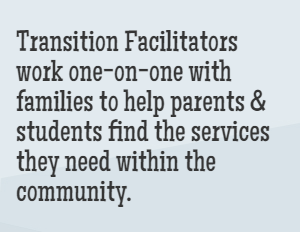 Once a student graduates, however, families must look outside of the school system for support. There is a rich network of government agencies and adult service providers in the community that can assist with everything from medical benefits and transportation to social activities and job placement for eligible adults with disabilities, but you need to know where to look. To help families understand the resources available, transition facilitators host the Life Transition Series in partnership with The Arc of Central Chesapeake Region (Arc). This series offers high school students and parents a series of workshops designed to share information on a wide range of opportunities from financial planning to guardianship and connect families to important governmental agencies such as the Developmental Disabilities Administration (DDA) and the Division of Rehabilitation Services (DORS).
Once a student graduates, however, families must look outside of the school system for support. There is a rich network of government agencies and adult service providers in the community that can assist with everything from medical benefits and transportation to social activities and job placement for eligible adults with disabilities, but you need to know where to look. To help families understand the resources available, transition facilitators host the Life Transition Series in partnership with The Arc of Central Chesapeake Region (Arc). This series offers high school students and parents a series of workshops designed to share information on a wide range of opportunities from financial planning to guardianship and connect families to important governmental agencies such as the Developmental Disabilities Administration (DDA) and the Division of Rehabilitation Services (DORS).
Transition Facilitators know that accessing these resources can seem overwhelming. So, while the student is still in high school, Transition Facilitators work one-on-one with families to help parents and students navigate the application process to find the services they need within the community. As Kristina Cooley, a transition facilitator, says, “I feel like [working with parents] is one of the most important parts of my job because life after high school is so much more complicated if you need access to services. There’s a lot of help out there, but you have to seek it out, you have to find it.”
One important component of providing that help is by giving student the opportunity to gain workplace experience while still in high school. To do this, Transition Facilitators depend on the support of the business community and the guidance of our AACPS Vocational Technicians.
Developing Workforce Skills in the Community
On Thursday Morning, Vocational Technician Lita Ciaccio helps a group of students from Chesapeake High School check in at the front desk of Genesis Healthcare, a rehabilitation and nursing home facility. Lita takes Daniel* and Josh* to the therapy room where the nurse asks the students to trade the empty oxygen tanks for new ones. Daniel, who has worked at Genesis before, shows Josh how to open the security door to the supply shed without setting off the alarm. Lita teaches Josh to read the oxygen meter and the students pick up full tanks and walk back down to the therapy room. Over the next two hours, staff members ask Josh and Daniel for help on a variety of tasks from restocking the therapy linen closet with clean sheets from the laundry room to helping clear plates in the dining room after lunch.
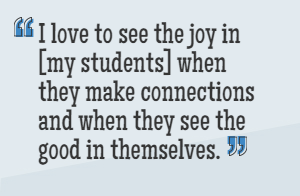 These students are part of the Enclave Training Program, a program that brings students in Alternative Curriculum Class(ACC; formerly known as Functional Life Skills)—those with more severe disabilities—to local businesses to develop job skills and gain a variety of experiences. With the support of the vocational technician, who works one-on-one and with groups of students as a job coach, the Enclave Program helps students learn how to be successful in the workplace. Whether teaching how to clock in and out for work, follow written or verbal directions, perform a specific task, or act in a professional environment, the Enclave Training Program exposes students to the workforce—often for the first time.
These students are part of the Enclave Training Program, a program that brings students in Alternative Curriculum Class(ACC; formerly known as Functional Life Skills)—those with more severe disabilities—to local businesses to develop job skills and gain a variety of experiences. With the support of the vocational technician, who works one-on-one and with groups of students as a job coach, the Enclave Program helps students learn how to be successful in the workplace. Whether teaching how to clock in and out for work, follow written or verbal directions, perform a specific task, or act in a professional environment, the Enclave Training Program exposes students to the workforce—often for the first time.
As students progress through the program and move to new enclave sites (students usually experience two different job sites each year) and/or onto more independent work placements, both their skills and confidence blossom. These experiences help students develop a strong resume while still in high school, giving them a step up to find a job once they graduate. “I love seeing my students succeed,” Lita says. “I love to see the joy in them when they make connections and when they see the good in themselves.”
Building Relationships to Support Our Students
After leaving Genesis, Lita stops by a new restaurant in Pasadena to talk to the manager about a possible job opportunity for one of her students, Robert.* Robert, who Lita has been job coaching for the past few months, has some emotional and cognitive disabilities, but does well doing repetitive tasks such as folding napkins around silverware and refilling salt and pepper shakers. Lita has created a sample “Dining Attendant” job description that she believes the student could successfully fill and already talked to several managers about possible opportunities.
Lita and her colleagues are constantly reaching out to talk to businesses about the Enclave Training Program and Supported Employment Program (an immersive program that places students in full or part time employment with ongoing job coaching and monitoring) and the skills that their students can bring. The success of these programs depend on the support of the business community and the transition team will do whatever it takes to develop this trust. From following a student to make sure public transportation will get them to work on time, to adding photographs to make a written task list easier for a student to follow, the businesses knows that they can depend on the transition team to make sure the placement is a success. Currently, AACPS students are supported by a long list of business partners including Giant Food, UPS, JC Penny, Double T Diner, Greenstreet Growers, K-Mart, and the Severna Park Community Center, just to name a few.
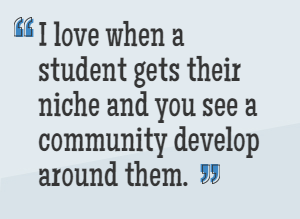 Developing these relationships takes an incredible amount of time and is not always immediately positive. But even if it takes multiple phone calls and personal visits to make sure a business feel comfortable hosting a student, once that partnership is in place, businesses see the dedication and enthusiasm of the student and support him or her in whatever way they can. This, says Vocational Technician Brenda Jasper, is one of the most rewarding parts of their job. “I love when a student gets their niche and you see a community develop around them.”
Developing these relationships takes an incredible amount of time and is not always immediately positive. But even if it takes multiple phone calls and personal visits to make sure a business feel comfortable hosting a student, once that partnership is in place, businesses see the dedication and enthusiasm of the student and support him or her in whatever way they can. This, says Vocational Technician Brenda Jasper, is one of the most rewarding parts of their job. “I love when a student gets their niche and you see a community develop around them.”
In addition to working directly with businesses, the Transition Team also works closely with other transition programs from within the community. Whether the program is hosted by the community college, non-profit, or another local organization, each leverages relationships between the school system, service providers, and the business community to provide opportunities for our students. (For detailed information about all of the transition programs available in AACPS—or to learn how your business can support these programs—click here.)
One such program is the On-Campus Transition Program, a two-year program hosted by the Anne Arundel Community College where students can take college level courses, participate in campus activities and receive instruction in life skills. This program offers Special Education students, many of whom remain in high school until they are 21 years old, the opportunity to engage socially in an environment with students closer to their own age while still receiving support from AACPS and community college staff.
AACPS also works with two community-based internship programs. Project SEARCH is a business led internship program coordinated by a partnership between Sheppard Pratt Health Systems, the Arc, and DORS. Using an international program model, Project SEARCH engages students in three 10-week internships that expose students to a wide range of service-oriented jobs at either the Hilton at BWI or the Anne Arundel Medical Center. Start On Success (SOS) is an internship program established by Humanim, a Baltimore-based non-profit adult provider. SOS engages students in paid internships in departments throughout the Baltimore Washington Medical Center such as the Emergency Room, Mail Room, Childcare/Pediatrics, and many others. In addition to on-the-job training, both of these programs also help students learn “soft skills” such as effective communication, resume building, interview strategies, and job search techniques.
While each of these programs use a different model, all recognize the benefits that studetns gain from real-world experiences. Mary Kay McGuire, the Project SEARCH Coordinator for Anne Arundel County, says, “Community-based programs like this are important because it gives the students—the interns—that opportunity to grow, but it also exposes the community at large to see what’s possible first hand…We have a group of interns that want to work, [but] are not being utilized.” Through programs like Project Search and other community-based programs, the business can see how much these students are capable of while still supported by the resources in the school system.
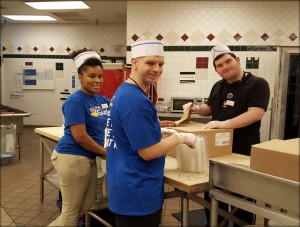 Providing a Lifeline to Our Students and Families
Providing a Lifeline to Our Students and Families
For students with disabilities, leaving the security of the school system can be overwhelming. But with the support of the county’s dedicated transition team and incredible community partners, every family has a guide to help them find their way. “They are the life link for these students,” says Stephen Spence, Special Education Department Chair at South River High School. “I can’t stress enough how important they are to these student’s lives.”[/fusion_text]
